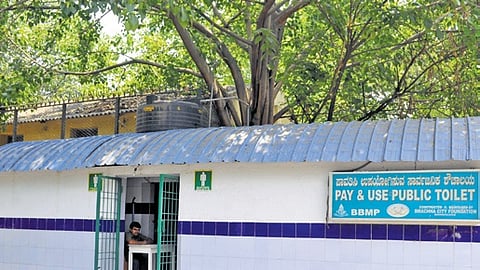

BENGALURU: Toilets lack proper locks and latches, have inadequate lighting, users are overcharged and male cleaning staff are found in women’s toilets — these were some of the shocking revelations on the status of Bruhat Bengaluru Mahanagara Palike’s (BBMP) public toilets in Bengaluru.
The distressing state of 48 public toilets in the city has come to light with a survey titled ‘The Big Bengaluru Toilet Survey’, conducted by Nguvu Change leader Archana KR. The findings underscore significant safety concerns for women utilizing these facilities.
Shockingly, 75 per cent of the surveyed toilets lack proper locks and latches on doors, posing a serious security risk. Video evidence captured during the survey exposes instances of both male and female cleaning staff residing within women’s toilets, which are critical lapses, according to the report.
Additionally, 66 per cent of these facilities suffer from inadequate lighting, heightening the sense of insecurity, particularly for women using public toilets at night. The survey further reveals a stark gender-based disparity in user costs, with male users paying only Rs 2, while their female counterparts are charged Rs 5, more than double the amount, highlighting an inequality in access and affordability, the report revealed.
The examination also highlighted critical shortcomings for women. A staggering 91 per cent of women’s toilets lack dustbins for the disposal of sanitary napkins, turning the facilities into open bins strewn with used sanitary pads, tissues and plastic. Half the toilets have drainage pipe blockages at least once every quarter, exacerbating the already challenging conditions.
The deficient state of these facilities also raises concerns about basic hygiene, with a substantial 91 per cent needing amenities like consistent access to running water, mugs and cleaning materials.
Regarding inclusivity, the survey found that 91 per cent of the toilets are inaccessible to differently-abled people. Cleaning staff, many of whom are migrants from other states, face inhumane treatment and face challenges like lack of proper protective gear, leading to health issues like skin allergies. Living in unsanitary conditions in the toilets increases their difficulties, and the language barrier hinders their ability to communicate their needs. Of the 44 cleaning staff interviewed, only 66 per cent receive their wages regularly, adding another layer to the complex issues faced by these workers.
Archana KR and her team, who conducted the survey, suggested that BBMP should undertake comparable surveys, and implement corrective measures, both for current facilities and future toilet projects, and understand ground realities so as to create proper infrastructure for public needs.